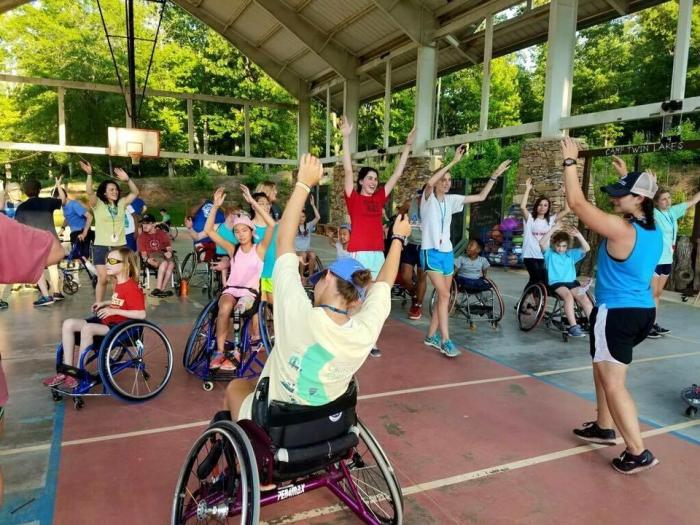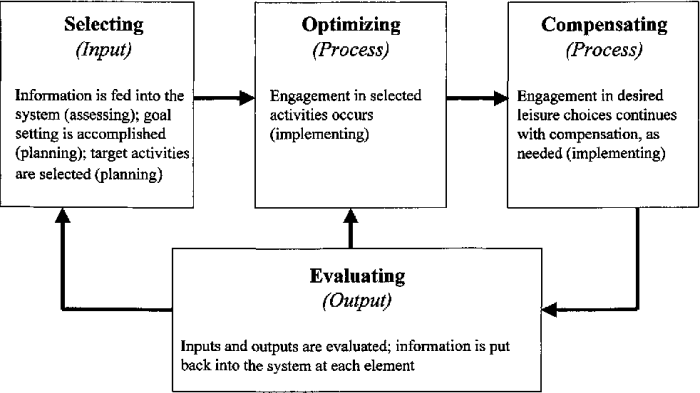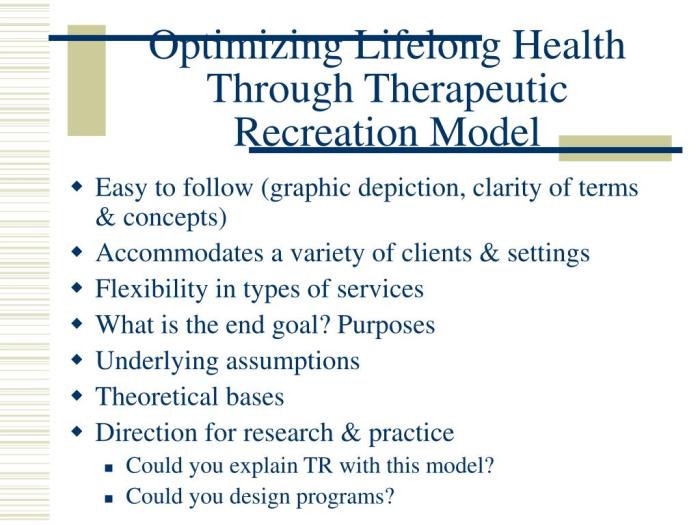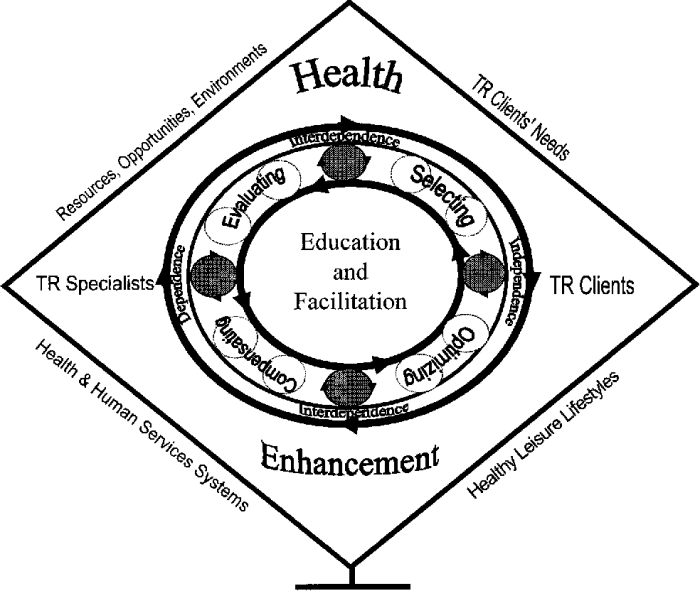Optimizing lifelong health through therapeutic recreation is a multifaceted endeavor that encompasses the promotion of physical, mental, and social well-being throughout the lifespan. Therapeutic recreation, as an evidence-based practice, plays a pivotal role in enhancing overall health outcomes by addressing individual needs and fostering active engagement in meaningful activities.
This article explores the concept of lifelong health, highlighting the key factors that contribute to its attainment. It delves into the benefits and applications of therapeutic recreation, providing guidance on assessing individual needs and designing effective programs. Furthermore, it addresses ethical considerations and strategies for implementing and evaluating therapeutic recreation programs in various settings.
Defining Lifelong Health

Lifelong health refers to the state of overall well-being that encompasses physical, mental, and social aspects throughout an individual’s life. It emphasizes maintaining optimal health and functioning at every stage of life, from childhood to old age. Key factors contributing to lifelong health include physical activity, nutrition, mental well-being, and access to healthcare and preventive services.
Key Factors Contributing to Lifelong Health, Optimizing lifelong health through therapeutic recreation
- Physical Activity:Regular exercise helps maintain a healthy weight, reduces the risk of chronic diseases, and improves overall physical and mental health.
- Nutrition:A balanced diet provides essential nutrients for growth, development, and disease prevention.
- Mental Well-being:Positive mental health promotes emotional resilience, coping mechanisms, and overall happiness.
- Healthcare and Preventive Services:Regular check-ups, screenings, and vaccinations help detect and prevent health issues early on.
Therapeutic Recreation and Its Role in Optimizing Lifelong Health: Optimizing Lifelong Health Through Therapeutic Recreation

Therapeutic recreation is a form of treatment that utilizes recreational activities to improve physical, mental, and social health outcomes. It is used in various settings, such as hospitals, rehabilitation centers, and community programs.
Benefits of Therapeutic Recreation
- Physical Benefits:Enhances mobility, coordination, and balance; reduces pain and fatigue.
- Mental Benefits:Improves mood, reduces stress and anxiety, and promotes cognitive functioning.
- Social Benefits:Fosters social interaction, reduces isolation, and builds a sense of community.
Examples of Therapeutic Recreation Activities
- Adapted sports (e.g., wheelchair basketball, modified swimming)
- Art and music therapy
- Nature-based activities (e.g., gardening, hiking)
- Social games and activities
Assessing Individual Needs for Therapeutic Recreation
Tailoring therapeutic recreation programs to individual needs is crucial for maximizing benefits. A thorough assessment should consider:
Physical Factors
- Mobility and functional abilities
- Pain and discomfort
- Physical limitations
Cognitive Factors
- Attention and concentration
- Memory and problem-solving skills
- Cognitive impairments
Emotional Factors
- Mood and affect
- Anxiety and stress levels
- Emotional regulation
Designing Effective Therapeutic Recreation Programs

Effective therapeutic recreation programs should:
Key Principles
- Goal-oriented:Align with specific health outcomes
- Individualized:Tailored to individual needs and preferences
- Evidence-based:Supported by research and best practices
- Engaging and enjoyable:Promote participation and adherence
Program Models
- Individualized Plans:Designed for specific individuals with unique needs
- Group Programs:Foster social interaction and support
- Community-Based Programs:Utilize existing community resources and activities
Implementing Therapeutic Recreation Programs
Successful implementation involves:
Practical Guidance
- Secure Funding and Resources:Ensure adequate financial support and materials
- Recruit and Train Staff:Hire qualified and experienced therapeutic recreation specialists
- Engage Participants:Market the program and actively recruit participants
- Monitor and Evaluate:Track progress and make adjustments as needed
Evaluating the Effectiveness of Therapeutic Recreation Programs

Evaluation is essential to ensure programs are meeting their goals.
Evaluation Methods
- Outcome Measures:Track specific health outcomes (e.g., physical function, mood, social interaction)
- Process Measures:Monitor program implementation (e.g., participation rates, adherence to plans)
- Participant Feedback:Gather feedback from participants to assess satisfaction and identify areas for improvement
Ethical Considerations in Therapeutic Recreation
Ethical principles guide the provision of therapeutic recreation services.
Ethical Considerations
- Informed Consent:Obtain consent from participants before engaging in any activities
- Confidentiality:Maintain the privacy of participant information
- Respect for Autonomy:Allow participants to make informed decisions about their care
- Beneficence:Prioritize the well-being of participants
Answers to Common Questions
What are the key factors that contribute to lifelong health?
Physical activity, nutrition, mental well-being, and social connections are essential factors for maintaining lifelong health.
How can therapeutic recreation benefit individuals?
Therapeutic recreation can improve physical fitness, reduce stress, enhance cognitive function, promote social interaction, and increase overall well-being.
How are therapeutic recreation programs designed?
Therapeutic recreation programs are designed based on individual assessments that consider physical, cognitive, and emotional factors. Programs are tailored to meet specific needs and goals.
What are the ethical considerations in providing therapeutic recreation services?
Informed consent, confidentiality, and respect for participant autonomy are paramount ethical considerations in therapeutic recreation.